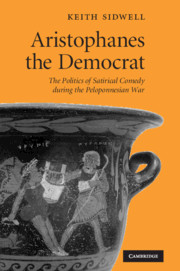Book contents
- Frontmatter
- Contents
- Detail of illustration
- Preface
- Acknowledgements
- List of abbreviations
- PART I SETTING THE STAGE
- PART II THE POETS' WAR
- Conclusions and consequences
- PART III APPENDICES
- Appendix 1 The view from the theatron
- Appendix 2 Metacomedy and caricature in the surviving fourth-century plays of Aristophanes
- Appendix 3 Timeline and proposed relationships between comedies
- Appendix 4 The date of Eupolis' Taxiarchoi
- Appendix 5 Clouds 868–73 and τραυλίζω
- Appendix 6 Michael Vickers on Strepsiades and Pericles
- Bibliography
- Index
- Index Locorum
- Index of Modern Scholars
Appendix 5 - Clouds 868–73 and τραυλίζω
from PART III - APPENDICES
Published online by Cambridge University Press: 27 January 2010
- Frontmatter
- Contents
- Detail of illustration
- Preface
- Acknowledgements
- List of abbreviations
- PART I SETTING THE STAGE
- PART II THE POETS' WAR
- Conclusions and consequences
- PART III APPENDICES
- Appendix 1 The view from the theatron
- Appendix 2 Metacomedy and caricature in the surviving fourth-century plays of Aristophanes
- Appendix 3 Timeline and proposed relationships between comedies
- Appendix 4 The date of Eupolis' Taxiarchoi
- Appendix 5 Clouds 868–73 and τραυλίζω
- Appendix 6 Michael Vickers on Strepsiades and Pericles
- Bibliography
- Index
- Index Locorum
- Index of Modern Scholars
Summary
It is clear from the Wasps joke (45) that at least one thing which could be understood as τραυλίζειν is substituting λ for ρ. Dover and Sommerstein on 872 agree that the pronunciation of κρέμαιο is criticised by Socrates for the slurring of the final vowel to [aew] or [ae]. But this seems most unlikely, since the final vowel is elided in Socrates' response and in any case there will have been a tendency for such final short vowels to be very unobtrusive even when the word is fully pronounced as at 870. In that case it is more likely that it is the consonant ρ which is the focus of the jibe. Is there in fact any positive evidence to connect τραυλίζειν with a fault of vowel as opposed to consonant pronunciation? Dover's interpretation of χείλεσιν διερρυηκόσιν is as follows: ‘In κρέμαιο the lips meet on μ, part on α, stretch a little on ι and are rounded on ο. μ is an easy sound for infants; difficulty in pronouncing rolled ρ (unlike difficulty in pronouncing the very rare sound written ‘r’ in English) is not apparent in the movement of the lips; thus the only pronunciation which makes sense of Socrates' words is something like [k(r)emaew].’ But his argument on [ρ] misses the point. If Socrates is criticising a slight mispronunciation, then we might speak of ‘difficulty in pronouncing rolled ρ᾽.
- Type
- Chapter
- Information
- Aristophanes the DemocratThe Politics of Satirical Comedy during the Peloponnesian War, pp. 349Publisher: Cambridge University PressPrint publication year: 2009



